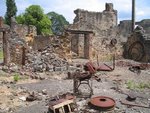syscom3
Pacific Historian
"I feel guilty about the terrible crimes in Oradour," Barth was quoted as telling the Berlin tabloid B.Z. at the time of his release. "But I have paid long enough.
BLOW IT OUT YOUR A**. YOU DIDNT SUFFER LIKE YOUR VICTIMS!!!!!!!!!!!!!"
By THOMAS SEYTHAL, Associated Press Writer Tue Aug 14, 10:20 AM ET
FRANKFURT, Germany - Heinz Barth, a former SS officer convicted of involvement in the massacre of an entire village in Nazi-occupied France, has died, a priest in the town where he lived said Tuesday. He was 86.
Barth died of cancer in the past few days, said Heinz-Dieter Schmidtke, the parish priest in Gransee, north of Berlin. He could not provide the exact date of Barth's death and did not say where he died.
In 1983, a court in East Berlin convicted Barth and sentenced him to life in prison for his role in the slaughter of villagers in Oradour-sur-Glane in 1944, widely considered the worst atrocity in Nazi-occupied France.
On June 10, 1944, as they headed toward Normandy to combat D-Day invasion forces who landed four days earlier, German troops of the armored SS Division "Das Reich" slaughtered 642 men, women and children in the village.
The Germans rounded up the village men, forced them into barns and machine-gunned them. The 241 women and 209 children were herded into the church, which was set afire with grenades and then shot at with machine guns.
"There are some events that can never be forgiven or forgotten," Alain Marleix, the top French official for veterans affairs, said in a statement. "The death of this sinister person, more than a half-century after the victims of his own crimes, draws no tear or regret from me."
In addition to involvement in the massacre, East German judges also found that Barth volunteered to participate in an execution of 92 Czech civilians in 1942.
Barth, the SS equivalent of a lieutenant, was also sentenced to death in absentia in France in 1953.
Barth lived under a false name in communist East Germany, working as a decorator in Gransee and running a grocery store, until his identity emerged in 1981 and he was imprisoned.
In 1997, a state court freed Barth on health grounds, commuting his sentence to probation. Barth, who lost a leg in the war, suffered from diabetes, high blood pressure and other ailments.
"I feel guilty about the terrible crimes in Oradour," Barth was quoted as telling the Berlin tabloid B.Z. at the time of his release. "But I have paid long enough."
Schmidtke said Barth had lived a secluded life in Gransee. He said Barth's burial would take place in September.
Barth's death "reminds France of one of the most tragic episodes of its history," French President Nicolas Sarkozy's office said in a statement. Sarkozy "pays tribute to the victims and to the pain of his descendants," it added.


